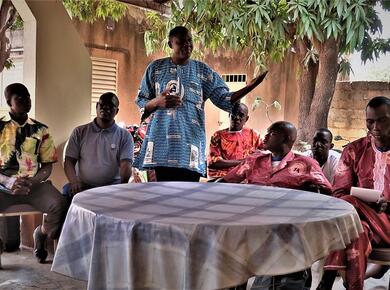Posted: November 1, 2020
Pandemic and racism loom large in the Americas and in many parts of the world today. Those scourges also were rampant 500 years ago when Anabaptism emerged. Racism fueled European conquests in North and South America, and settlers brought diseases that killed millions of Indigenous people. Many settlers carried the cross and the sword, reflecting an alliance between church and militarized state.
One generation after this colonial expansion into the Americas began, Anabaptist renewal emerged in Europe. Most Anabaptists did not accept the marriage of church and state and did not participate directly in military conquest.
Failures
Anabaptists who settled in the Americas nevertheless sometimes benefitted from imperial conquest. The United States army expelled the last native peoples from Indiana, my home state, in 1838. My Anabaptist forebears soon arrived to possess land where Potawatomi people long had lived.
It is important to acknowledge such moral failures of the past. Nevertheless, we also can celebrate that God has raised up a global Anabaptist people whose highest loyalty is to Jesus and the Kingdom of God. Mennonite World Conference and Anabaptists around the world are commemorating 500 years since this renewal movement began in 1525. Early Anabaptists were energetic missionaries, reaching across national and cultural barriers to call for repentance and teach the peacemaking way of Jesus.
Better ways
Anabaptist theologian R. Bruce Yoder recently studied how one North American mission agency (Mennonite Board of Missions) reached out in Africa, Asia, Europe and South America by seeking dialogue with churches and cultures in the host countries. This approach emphasized “indigenization” and “decolonization.”
Instead of simply trying to transfer what they considered correct theology, these mission workers wanted new congregations to be self-theologizing, self-financing, self-administering and self-propagating.
The global character of Anabaptism today is, at least in part, the result of such dialogical mission. Yoder suggests that Mennonite World Conference must operate in a similar way as diverse cultures from 86 countries relate to each other.
Global Anabaptism needs guidance of the Holy Spirit, affirmation of the lordship of Jesus Christ, commitment to Scripture, deep listening and clear articulation of theological understandings.
Those qualities are essential for the future of Mennonite World Conference, and are consistent with our Shared Convictions statement. With the Spirit to unite and inspire us, diverse cultural expressions can flourish to the glory of God.
—J. Nelson Kraybill is president of MWC. He lives in Indiana, USA.
R. Bruce Yoder, “Dialogue as Theological Method: Mennonite Missionaries, West African Churches, and Twenty-First-Century Anabaptist Identity,” in Laura Schmidt Roberts et al eds., Recovering from the Anabaptist Vision: New Essays in Anabaptist Identity and Theological Method (New York: T&T Clark, 2020), 127-149.




Join the Conversation on Social Media
FacebookTwitterInstagramFlickrYouTube